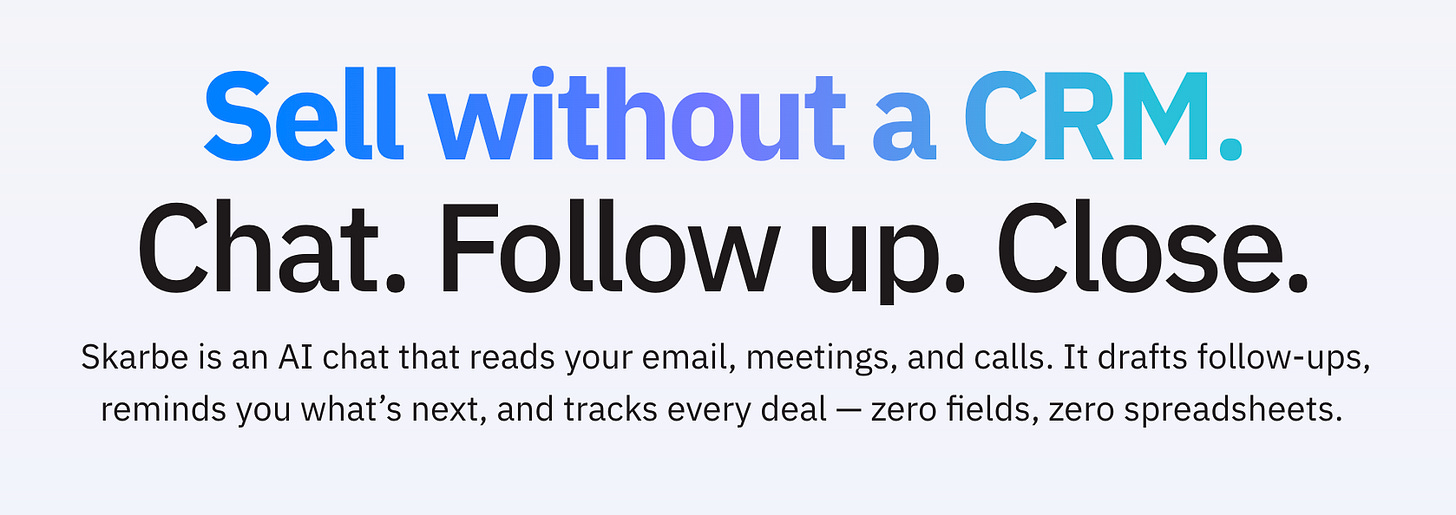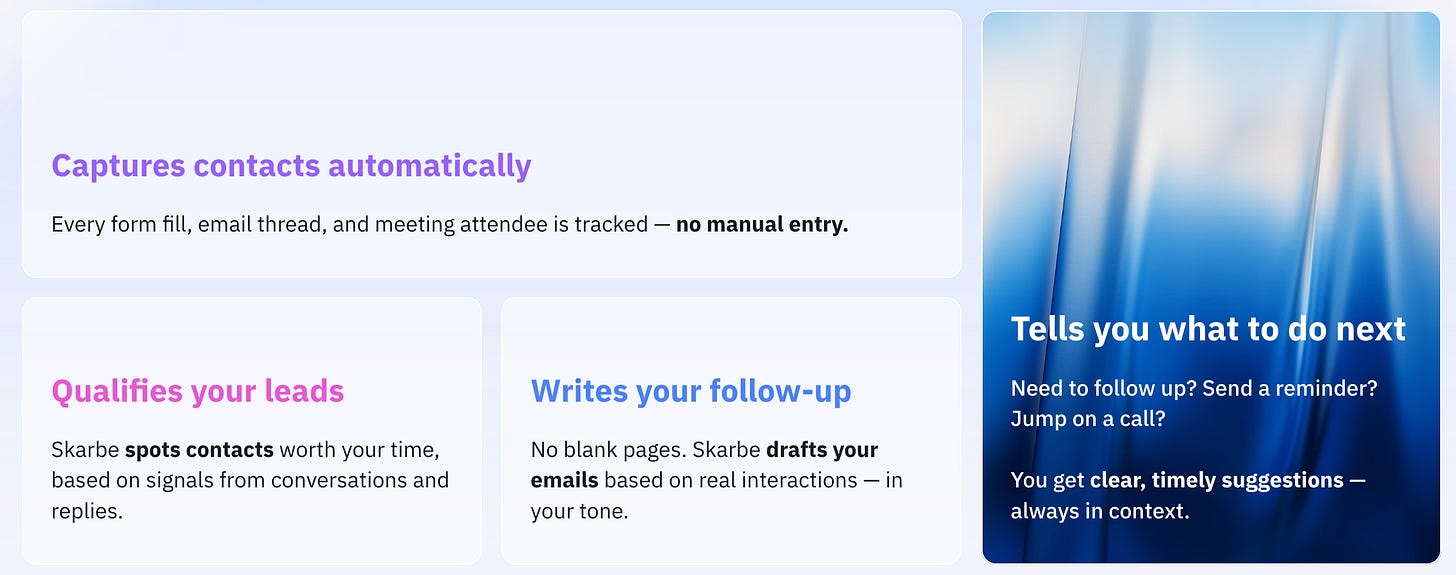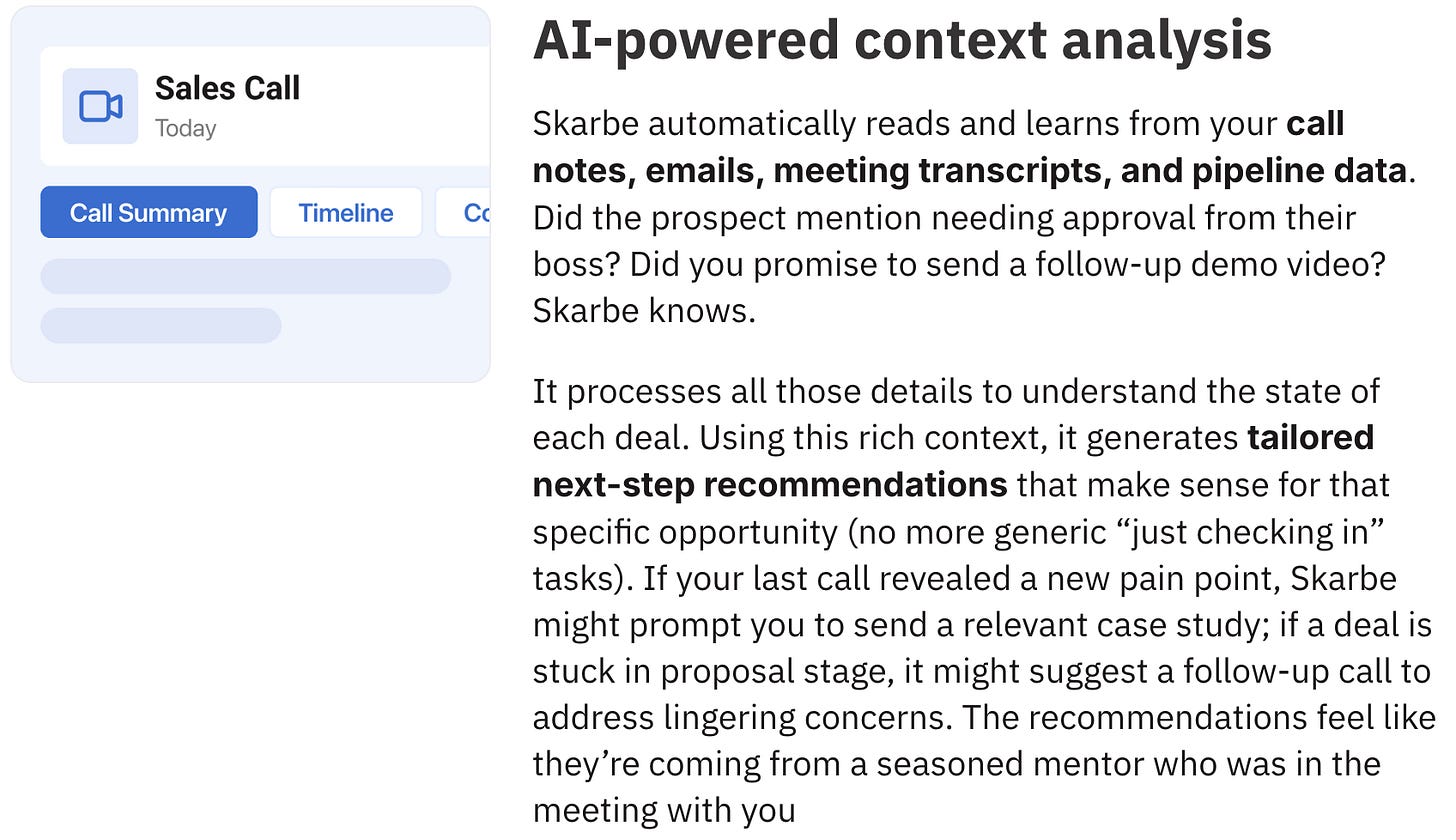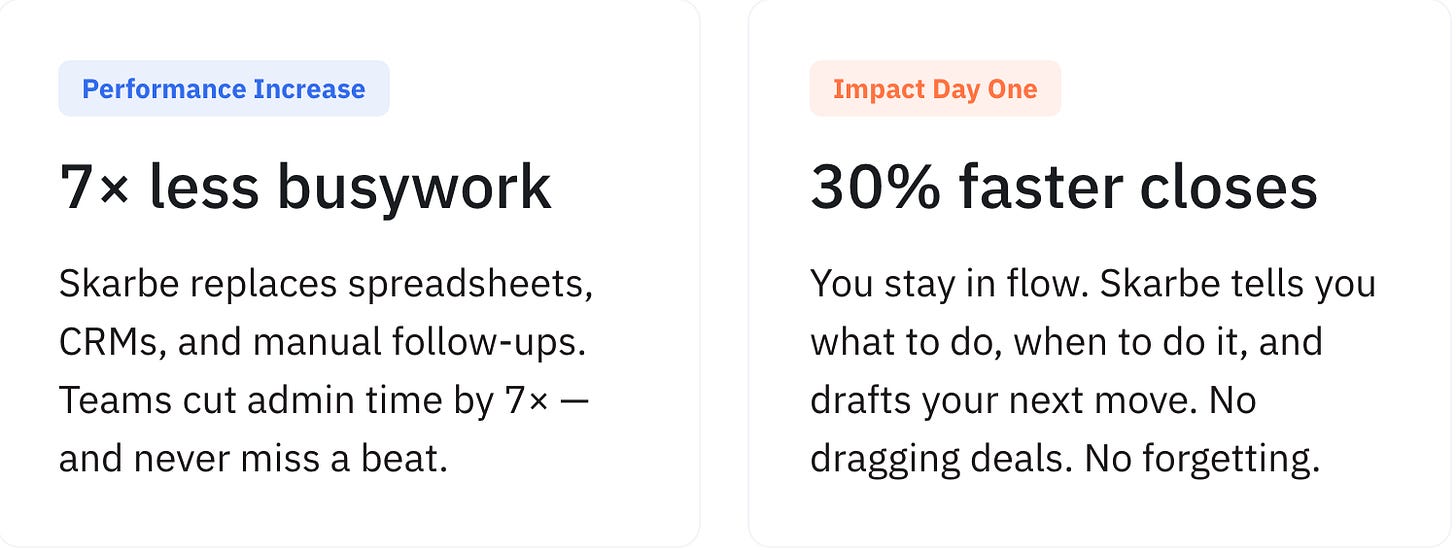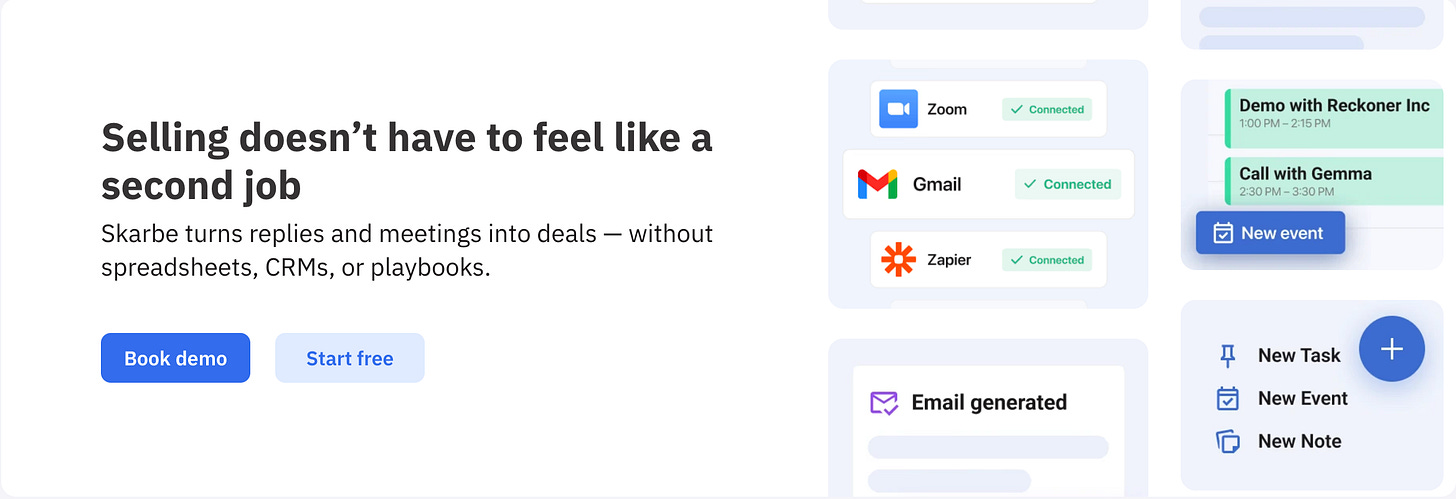Calm Within the Loop
Today’s featured startup is showing founders how to scale without drowning in chaos.
Project Overview
CRM is the backbone of almost every sales department — but Skarbe is building an AI tool that lets people sell without one.
Its target users are startup founders, solopreneurs, freelancers, and very small businesses where the founders or a handful of employees handle sales themselves.
“Selling without a CRM” means the AI assistant keeps track of conversations and meetings with leads and clients, identifies promising opportunities, and nudges you with timely next steps to help close the deal.
If a message needs to be sent, the AI drafts it. If a meeting is required, it schedules it — and before the call, it briefs you on who you’re talking to, what the current status is, and what you should bring up.
Crucially, Skarbe doesn’t just give vague prompts like “follow up with this lead.” It reviews your conversations and meeting transcripts to surface specific blockers, open questions, and action items — then reminds you to respond, follow up, or move the conversation forward.
It also enriches each contact automatically with company information found online — helping the system assess lead quality and recommend more precise actions to move things along.
Importantly, Skarbe doesn’t just react to client activity. It also monitors inactivity — a sign a deal may be stalling. In those cases, the AI suggests a follow-up — not a generic “just checking in,” but a message with a concrete question or proposal that can break the deadlock.
Once deployed in a company, the AI begins learning which types of prompts are most likely to result in closed deals — gradually improving its recommendations over time.
Using Skarbe can reduce time spent on sales admin by up to 7x — eliminating manual data entry, CRM lookups, and repetitive drafting. At the same time, it can shorten sales cycles by around 30%, mostly by preventing conversations from going cold.
Pricing starts at $35 and $65/month, with unlimited users per workspace, but caps on things like contact enrichment, report formats, message generations, and call transcriptions.
Skarbe supports over 100 languages for analyzing communication and delivering insights. More than 2,500 users are already on the platform — which likely includes entire teams from client companies.
The founding team is originally from Belarus and now operates out of Poland. They’ve raised $600,000 in pre-seed funding.
What’s the Gist?
As with many modern AI platforms, Skarbe isn’t breaking ground with new technology — it’s repackaging familiar tools into something people actually want to use. And often, that packaging is the product.
Its audience is clear: startup founders, solopreneurs, and owners of very small businesses — people who have to sell, whether they like it or not, often while juggling product development or customer support.
For these people, sales becomes a second job — and most can’t do two jobs with equal focus and care. There’s not enough time, and frankly, not enough energy or mental bandwidth. Skarbe is tackling both problems.
First, it saves time: no need to input or search through CRM records — the AI handles that in the background.
But just as importantly, it eases the mental load. “Work” is exhausting when it involves repetitive tasks you’re forced to keep up with — like a technical founder who must check the CRM every morning, pull out follow-ups, and manually plan their outreach before writing a single line of code. Over time, even this small ritual starts to feel nauseating — which means it’ll either be done poorly or avoided entirely. That leads, inevitably, to missed deals.
Skarbe flips this dynamic. Instead of morning CRM drudgery, you might get a simple prompt like:
“There’s a lead at this company — here’s the current status. Want to send this draft email?”
Or: “These people are waiting on you to do X — it’ll only take 10 minutes.”
Or: “You’ve got a call in 15 minutes with this team — here’s what you should cover.”
Yes, it still interrupts your day — but it doesn’t dominate it. Sales becomes something you react to, not something you structure your entire workflow around.
The Skarbe team believes anyone can sell — as long as sales aren’t treated as a full-time job, but rather a series of lightweight, timely nudges. They call this approach vibe-based selling — inspired by the “vibe-coding” trend, where devs communicate their goals to AI in plain language and let the system handle the execution.
Vibe-based selling works the same way: you’re not actively doing sales in the traditional sense. You’re just responding to well-timed nudges with simple actions that stack up to real results.
In essense, this is an attempt at an “ideal sales system” — one where the system itself seems invisible, but all of its functions are still performed. You’re not building a formal sales process, but you’re acting in a way that produces the same outcome.
There are other startups moving in adjacent directions. One is Day.ai, which raised $4M from Sequoia last summer. It calls itself an AI-native CRM — one that doesn’t require custom fields or relational tables. Just have your usual calls and write your usual messages, and the AI will structure and store everything behind the scenes.
Another is Motion, which focuses on task management. Instead of static to-do lists, it tells each team member what to prioritize right now based on the broader project context. Motion has already raised $63.6M, including $36.5M last summer.
Key Takeaways
It’s often said that great businesses aren’t just built by people who can do something — but by people who can create systems for doing it.
Selling isn’t just about being good at sales. It’s about building a repeatable system that scales beyond yourself. Same goes for programming, filmmaking, or any other creative work — eventually, it’s about turning skill into structure.
The classic example is Henry Ford, who didn’t just build cars — he built the assembly line that made car production fast, cheap, and scalable.
At first, we assumed AI would plug into systems like that — performing tasks on our behalf. But tools like Skarbe and Motion flip that logic on its head.
What if AI builds the systems — and humans operate within them?
That might be more effective. Motion claims it can double team productivity by guiding how people work. Skarbe, meanwhile, gives small business owners a systemized way to sell — without actually building a traditional sales system.
This opens up a fascinating direction: AI platforms that don’t just automate tasks, but design the systems in which humans and AIs work together.
So the key question becomes:
Which systems in modern business are too inefficient or too complex for most people to build themselves?
And can AI help construct — and improve — those systems for them?
Company info:
Skarbe
Website: https://skarbe.com/
Last funding round: $600K, 30.06.2025
Total funds raised: $600K after 1 round



